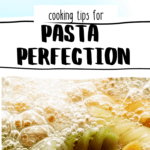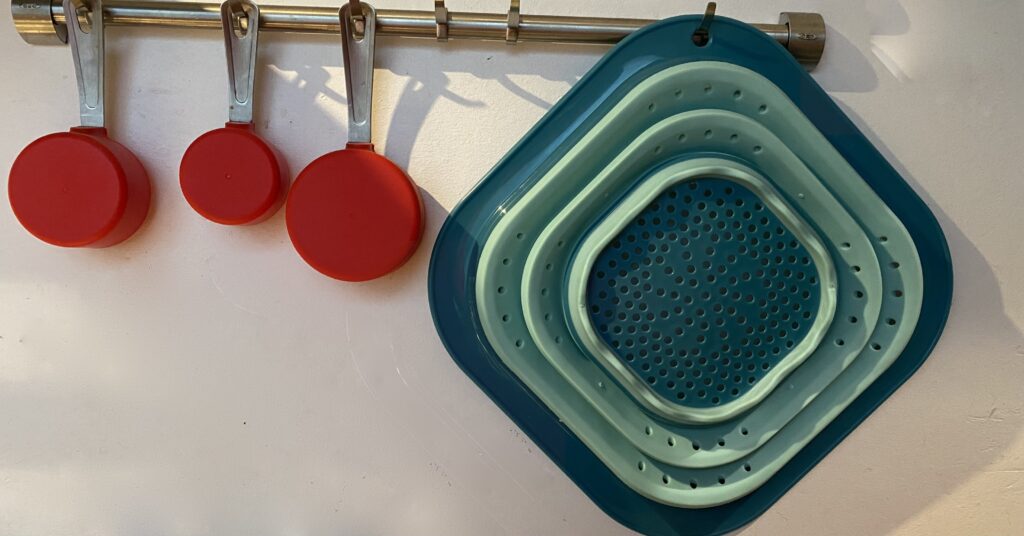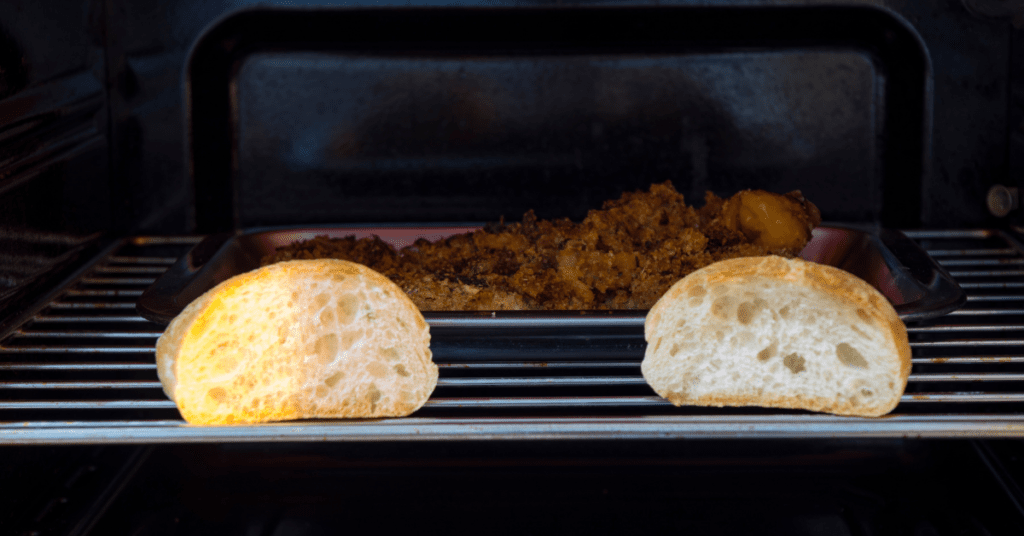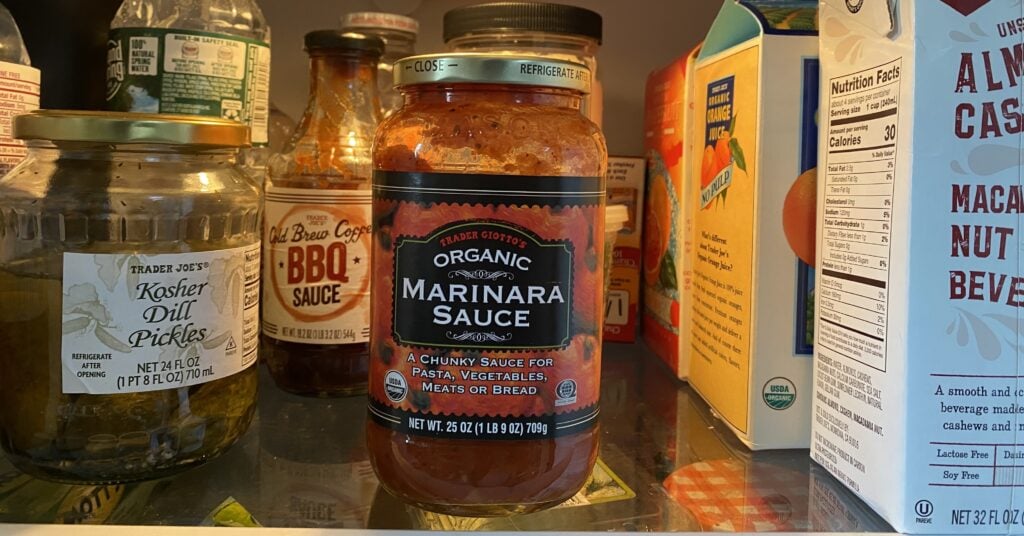Can you leave pasta in the water after cooking? Have you ever been in a rush to get dinner on the table and wondered if you could leave that pasta pot on the stove after it’s done cooking? The answer is no; you should not leave pasta in the water after cooking.
Your best bet is to serve pasta or spaghetti when it’s al dente.
It can become mushy and overcooked, but it can keep the pasta warm and ready to serve if done correctly.
One important thing to remember is that pasta continues to cook even after you drain it. So, if you leave it in the strainer too long, it can become overcooked and lose its texture.
To prevent this, remove the pasta from the water a minute or two before it’s fully cooked; sometimes, it might cook more in the sauce.
Another factor to consider is the type of pasta you’re cooking. Thicker pasta like penne or rigatoni can handle sitting in the water for a bit longer than thinner pasta like spaghetti or linguine.
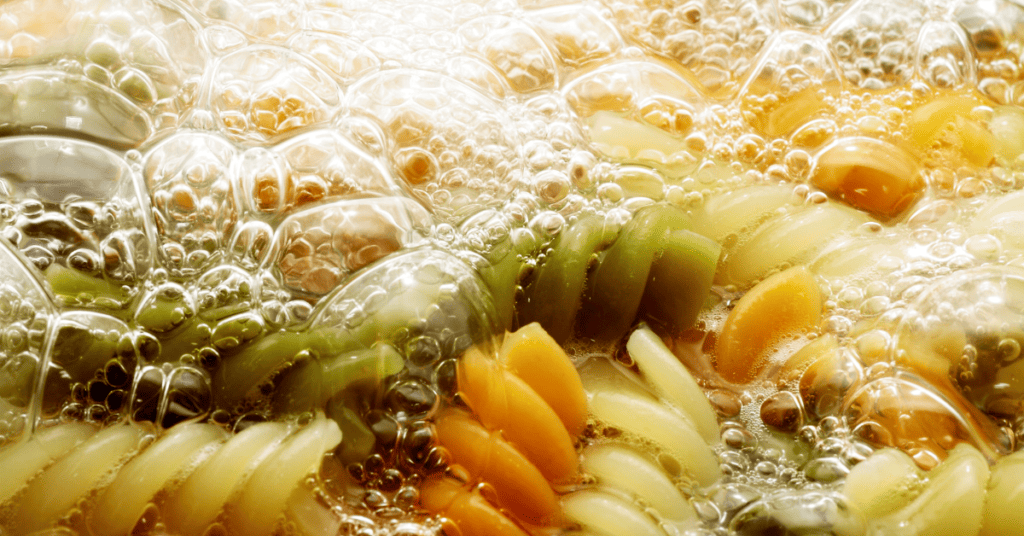
It’s also good to stir the pasta or spaghetti occasionally while sitting in the water to prevent it from clumping together. Check out our article on the differences between pasta and spaghetti.
Why Leaving Pasta in Water is a Bad Idea
Can you leave pasta in the water after cooking? If you leave your pasta in boiling water after it’s finished cooking, we’ll explain why it’s a bad idea.
While this may seem convenient to keep your pasta warm until you’re ready to serve it, you’ll end up with mushy pasta.
Firstly, leaving your pasta in the water can cause it to become overcooked and mushy.
This is because the pasta continues to cook even after you turn off the heat, and the longer it sits in the hot water, the softer it becomes. The end result is a less-than-ideal texture and flavor.
Secondly, leaving your pasta in the water can also cause it to absorb too much water, which can dilute the flavor of your sauce.

Adding additional moisture to the pasta sauce is especially problematic if you’re using a delicate sauce that can easily be overwhelmed by the taste of plain, soggy pasta.
Lastly, leaving your pasta in the water can also increase the risk of bacterial growth. As the pasta sits in the warm, moist environment of the pot, bacteria can begin to multiply, leading to foodborne illness if you’re not careful.
Overall, avoiding leaving your pasta in the water after cooking is best. Instead, drain it immediately and toss it with your favorite sauce for the best flavor and texture.
How to Cook Pasta Properly
Step 1: Boiling the Water
To cook pasta properly, you need to start by boiling water. Fill a large pot with enough water to cover the pasta thoroughly. Add a healthy amount of salt to the water to enhance the dish’s flavor profile.
Step 2: Adding the Pasta
Once the water is boiling, add the pasta to the pot. Be sure to use enough water to submerge the pasta entirely. Stir the pasta occasionally to prevent clumping and sticking.
Step 3: Stirring the Pasta
Stirring the pasta is important to ensure that it cooks evenly. Use a long spoon or fork to stir the pasta occasionally. Avoid over-stirring, as this can cause the pasta to break apart.
Step 4: Testing for Doneness
The best way to test if your pasta is done is to taste it. Start testing a few minutes before the recommended cooking time on the package.
Don’t take the pasta out of the water too early, or you’ll need to learn how to fix this undercooked pasta. All pasta is better al dente, meaning it should still have a slight firmness. Drain the pasta immediately once it’s cooked to your liking.
What Happens When You Leave Pasta in Water After Cooking?
If you’ve ever been in a hurry or distracted while cooking pasta, you may have accidentally left it in the water after it finished cooking. While it may not seem like a big deal, leaving pasta in water can have some adverse effects on the flavor or texture of the pasta.
Firstly, leaving pasta in water can cause it to become mushy and overcooked. As pasta sits in hot water, it continues to absorb the water and can become bloated and waterlogged. Soggy pasta can result in a loss of texture and flavor, making the pasta less enjoyable to eat.
Another issue with leaving pasta in water is that it can become sticky and clumpy. As the pasta sits, the starches on the surface of the pasta begin to gelatinize and can cause the noodles to stick together. This, in turn, makes it difficult to separate the pasta and can also affect the overall texture and taste.
If you accidentally leave your pasta in water after it’s finished cooking, removing it as soon as possible is best to prevent it from becoming overcooked and mushy.
You can also rinse the pasta with cold water to help stop the cooking process and prevent it from becoming sticky. However, rinsing it will also rinse away some of the sticky starches, which you need to help the sauce stick to the noodles.
So, while rinsing it is not recommended, over-cooking it is equally bad. So take the lesser of two evils and rinse it if needed.
Tips for Cooking Perfectly Al Dente Pasta
Cooking perfect al dente pasta is a skill that takes practice and patience. Here are some tips to help you master the art of cooking perfectly cooked pasta:
- Start with plenty of salted water; the salt helps flavor the pasta and also helps prevent it from sticking together.
- Use a large pot; this allows the pasta to move freely in the water, which helps cook it evenly.
- Stir the pasta occasionally; stirring prevents clumping and ensures the noodles cook evenly.
- Test for doneness frequently; start testing for doneness a few minutes before the recommended cooking time on the package.
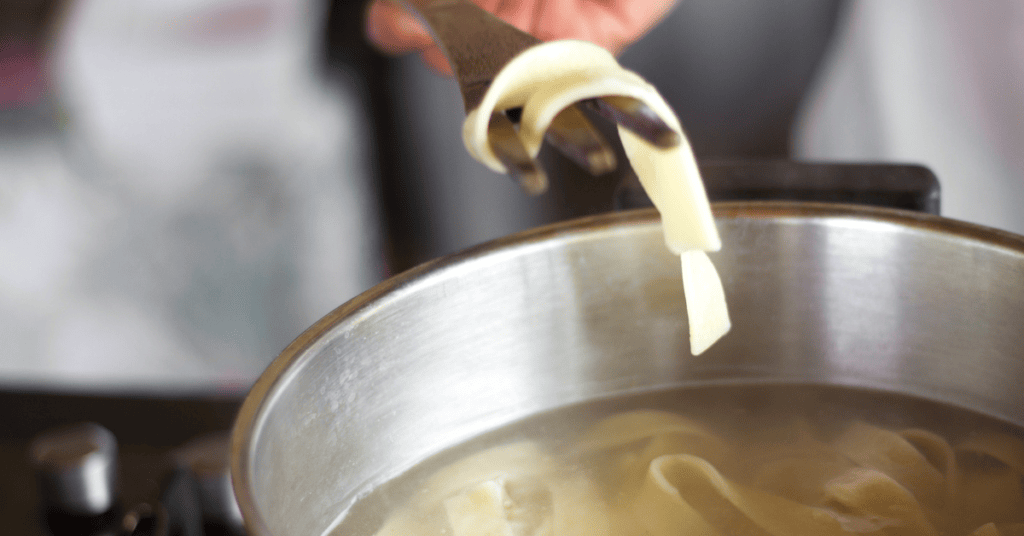
- When finished cooking, drain the pasta immediately. We love using the pasta pot with a locking strainer lid. Please don’t leave it in the water to cool down; this will cause it to overcook and become mushy.
Following these tips will help you cook perfect al dente pasta every time! So go ahead and give them a try next time you’re making pasta. With some practice, you’ll be an expert in no time.
How to Store Cooked Pasta
Since you know the answer to “Can you leave pasta in the water after cooking?” you are ready to store the leftovers. Once you’ve cooked your pasta, you may wonder how to store it properly to keep it fresh and delicious later. Here are three options:
Option 1: Refrigerating Cooked Pasta
The refrigerator is an excellent option if you plan to eat your cooked pasta within the next few days. Here’s how:
- Let the pasta cool down to room temperature.
- Place the pasta in an airtight food-safe container or a resealable plastic bag.
- Label the pasta container with the date so you can keep track of how long it has been stored.
- Store in the refrigerator for up to four days.
Option 2: Freezing Cooked Pasta
If you won’t be eating your cooked pasta for a while, freezing is a good option. Here’s how:
- Let the pasta cool down to room temperature.
- Place the pasta in an airtight food-safe container or a resealable plastic bag.
- You can also freeze any leftover spaghetti sauce!
- Label the pasta container or bag with the date so you can keep track of how long it has been stored.
- Store in the freezer for up to two months.
Option 3: Storing Cooked Pasta at Room Temperature
You can temporarily store your cooked pasta at room temperature if you have no refrigerator or freezer access. Here’s how:
- Let the pasta cool down to room temperature.
- Place the pasta in an airtight food-safe container or a resealable plastic bag.
- Store pasta in a cool, dry place away from direct sunlight for up to two hours.
By following these storage methods, you can ensure that your cooked pasta stays fresh and delicious whenever you’re ready.
Final Thoughts for Can You Leave Pasta in the Water After Cooking?
Now that you know the answer to “Can you leave pasta in the water after cooking?” you can decide how to handle your pasta. For optimal enjoyment, remember to drain the pasta and serve it promptly if you intend to consume it immediately.
However, if you’re not quite ready to serve the pasta, it’s best to drain it and make do. Although it’s not ideal, it can be a suitable option if you’re waiting for other parts of the meal to finish cooking or are not quite ready to eat.
The most important thing to remember is that you don’t want to leave your pasta in the water for too long, as it can become mushy and overcooked. Following the tips and guidelines outlined in this article ensures that your pasta is always perfectly cooked and ready to serve.
More Cooking Tips

